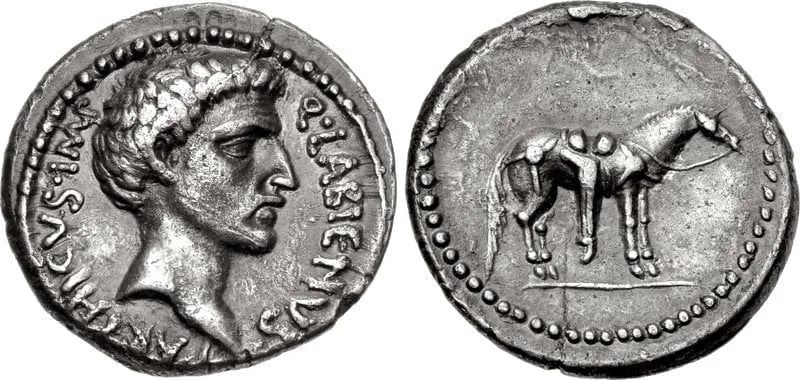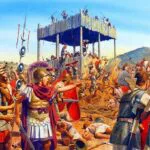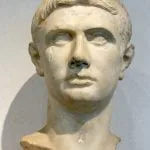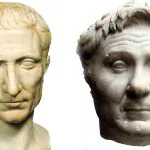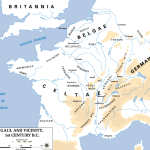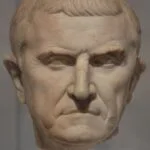Quintus Labienus was a Roman commander at the end of the Roman republic who allied with the Parthians. He was the son of Titus Labienus – the eminent commander of Caesar during the Gallic Wars and a later supporter of Pompey in the civil war – who died in the battle of Munda in 45 BCE.
After murder of Julius Caesar in 44 BCE, there was another civil war in which the forces of the “Caesarian” camp clashed (Mark Antony, Gaius Octavian, Marcus Lepidus) and “Republican” (Gaius Cassius Longinus, Marcus Junius Brutus). There was a clash at Philippi in 42 BCE, as a result of which Cassius and Brutus died or took their lives.
Young Labienus, being involved on the optimists side, tried to rebuild the Caesarian opponents’ camp. To this end, he wanted to use the Parthian Kingdom neighboring the Republic. To avoid pursuit and revenge, according to the message of Festus (Brewiarium of the history of the Roman people, 18), he fled to the Party. Cassius Dion, in turn, claims that Cassius and Brutus had sent him before the battle of Philippi to the Party asking for military support. The Parthian King – Orodes II – was waiting for the outcome of the battle and did not want to be active at this stage. With Antony taking independent and unpopular rule in the east, Labienus began to encourage Parthians to attack the border provinces. Party forces invaded Syria hoping that the inhabitants of other Roman provinces will stand up against Antony and not oppose the invasion. Command of the Parthian army was taken by Labienus and the son of the king – Pacorus I1 .
Labienus along with the party army first invaded Phenicia and attacked the city of Apamea. There, he managed to occupy the area without major fighting – mainly soldiers fighting earlier on the side of Cassius and Brutus were stationed in the region. Only Lucius Decidius Sax took up the fight, who first fled to Antioch, and then, under the pressure of Labienus, was forced to go to Cilicia. There he was captured and killed. Cilicia and Syria were subordinated, and only the city of Tyr maintained its position. The Parthians also invaded Judea, where they established Antigone on the throne in place of Jan Hirkan II.
Interestingly, Labienus, winning the next victories, adopted the nickname Parthicus, which was definitely against logic, because the nickname itself meant “conqueror of the Parthians”.
Cassius Dion and Plutarch agree that Mark Antony was extremely slow in his decisions. In 40 BCE he devoted himself to his lover Cleopatra and life in luxury in Egypt.
While Antony was indulging in such trifles and youthful follies, he was surprised by reports from two quarters: one from Rome, that Lucius his brother and Fulvia his wife had first quarrelled with one another, and then had waged war with Octavius Caesar, but had lost their cause p205 and were in flight from Italy; and another, not a whit more agreeable than this, that Labienus at the head of the Parthians was subduing Asia from the Euphrates and Syria as far as Lydia and Ionia.
– Plutarch from Cheronea, Life of Antony, 30
Finally, while in Greece, he decided to send his baked – Publius Ventidius Bassus – to take action against Labienus and the Parthians. Bassus was extremely effective in its activities. Labienus was shocked by Bassus’ speed of movement and was forced to retreat from Asia to Syria. Bassus followed him to finally deploy troops in the Taurus Mountains opposite the fortified enemy forces. Labienus expected Parthian support when Bassus waited for heavy infantry reinforcements. Finally the fight ended with Bassus’s decisive victory. The Parthans left Syria and Judea, from which terrified Antigone escaped.
According to Florus, eventually a clash of Roman forces with the Parthis took place between the Euphrates and Orontes rivers in 39 BCE. The battle ended with the victory of Bassus over an army of 20,000 Parthians and in the eyes of the Romans she was considered to be the answer to the tragic defeat of the defeat of Crassus in 53 BCE In the battle the son of the Parthian king – Pacorus and Labienus.

